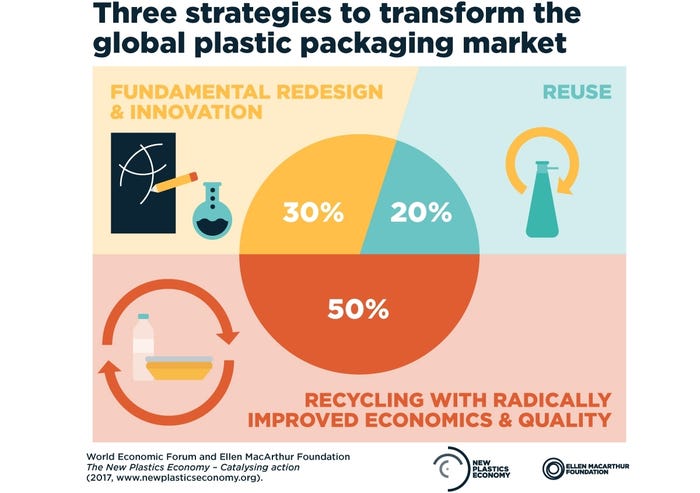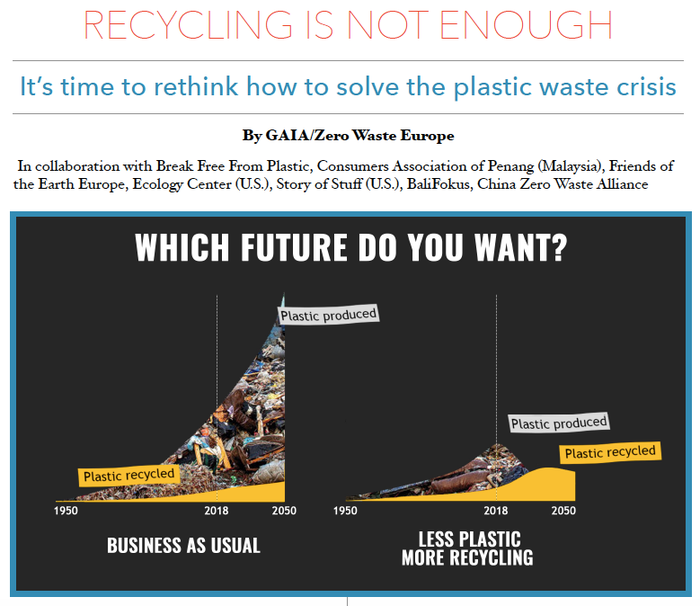Who’s Really to Blame for the Plastics Recycling Crisis? (Hint: It’s Not China)
Plastics recycling has always been mediocre at best and cannot keep pace with the explosion of plastics on the market—and it never will.

As recyclers struggle with the “recycling crisis” caused by China’s National Sword policy and search for new marketing approaches, the situation is being made all the worse by those capitalizing on the downturn and using it as an excuse to say that recycling has failed. While there is no doubt that China’s actions have upended the recycling industry’s “business as usual,” there’s something bigger bubbling to the surface: a watershed moment on the future of “junk” plastics.
The real problem isn’t China. The real problem is that the prolific, ever-increasing production of plastics is choking our planet, our oceans and our bodies. Recyclers did not create the plastic waste crisis—the plastics industry did, and it’s time we said enough is enough.
We as the recycling industry need to be honest: Plastics recycling has always been mediocre at best and cannot keep pace with the explosion of plastics on the market—and it never will. The use of plastics has increased twenty-fold in the past 50 years, yet only nine percent of plastics made since 1950 have been recycled. Most of those plastics that were recycled were down-cycled into lower-grade, single-use products rather than kept in a continuous loop.
Yet recyclers now find themselves on the frontlines of this international crisis. As an initial response, we need to rapidly develop stronger domestic markets for plastics recycling and more expansive education programs to reduce contamination. We also really need to stop the onslaught of plastic waste by first acknowledging that recycling alone cannot solve the problem. Then, we need a meaningful dialogue with all stakeholders, including the plastics industry, about how and when plastics do or don’t fit into the circular economy of the 21st century.
The Real Problems with Plastic
Let me clarify that this isn’t a tirade against all plastics: Plastics play a valuable role and have led to many advancements in medicine, technology and transportation. However, the gravity of the environmental, health and climate issues from the explosion of plastics in just half a century demonstrates that we can no longer turn a blind eye to the challenges they’re creating.
Here’s a sampling of the staggering problems unfolding worldwide:
The United Nations has called plastic pollution in the oceans a “planetary crisis.”
The amount of plastics in the oceans is projected to outnumber fish by 2050 (by weight).
The equivalent of one garbage truck full of plastic is dumped into our oceans every single minute, more than 8 million metric tons per year.
Nearly one-third of plastics produced end up in our oceans, in our soil or as litter because they are not captured by collection systems.
Plastics production is expected to double in the next 20 years and nearly quadruple by 2050.
Ninety percent of plastics are made from non-renewable fossil fuels.
By 2050, 20 percent of oil production will be used to make plastics, up from 6 percent today.
Only about 50 percent of plastics could be recovered using the best systems available today. Manufacturers continue to churn out countless plastics without creating end markets for recycling or reuse.
Simply put, if the images of turtles choking on plastic bags and remote islands covered with plastic litter don’t turn your stomach now, just wait—it’s only going to get worse if we don’t change course soon.
Vision for the Future: 50-30-20
We as recyclers need to coalesce on a vision and platform for change so we're not just fighting against junk plastics, but organizing around a concrete game plan toward a better future. I suggest we start building from the New Plastics Economy vision put forth from the Ellen MacArthur Foundation.
Ellen MacArthur has quickly become a leading global advocate for the circular economy and its environmental and financial benefits. The group has the attention of some of the world’s largest companies and top level EU policymakers. Its 2017 report, “The New Plastics Economy: Rethinking the Future of Plastics & Catalysing Action,” lays out a 50-30-20 plan for plastics—50 percent of plastics would be recycled, 30 percent would be redesigned and 20 percent would be replaced with reusable alternatives.

This is a powerful vision for several reasons:
First, it acknowledges that recycling plays a key role but also has its limits. Up to 50 percent recycling could be economically viable, but lots of work remains, considering the EU stands at 30 percent recycling currently and the U.S. captures only a paltry 10 percent of plastics for recycling.
Second, the report doesn’t mince words on the plastics that don’t fit into a circular economy, stating, “Without fundamental redesign and innovation, about 30 percent of plastic packaging will never be reused or recycled.” This includes:
Lids, caps, straws and candy wrappers and other “small format” items
Multi-materials products such as flexible packaging
Less common packaging materials such as PVC, EPS and PS
Third, its research identified another 20 percent of plastics that could be shifted to reusable alternatives that would result in economic benefits on the order of $9 billion.
Partially resulting from this work, the EU recently announced its goal to make all plastics reusable or recyclable by 2030.
The U.S. Takeaway
Is this 50-30-20 vision the precise formula that will work for the U.S. recycling industry and our communities? That’s a big, long conversation to be had with many others—industry, government, NGOs, consumers, etc. But the point isn’t exactly how the numbers should shake out. The point is that it’s time to change. We need a new path that doesn’t accept the projected onslaught of plastic waste as a given.
Recyclers have the spotlight now, whether we like it or not. Let’s make this a turning point and use our power and our voice to reframe the discussion and create a future that better serves our health, our economies and the rest of the planet.

Kate Bailey is the project director of Eco-Cycle Solutions and works with citizens, government staff and elected officials to implement zero waste solutions around the U.S.
About the Author
You May Also Like


.png?width=300&auto=webp&quality=80&disable=upscale)